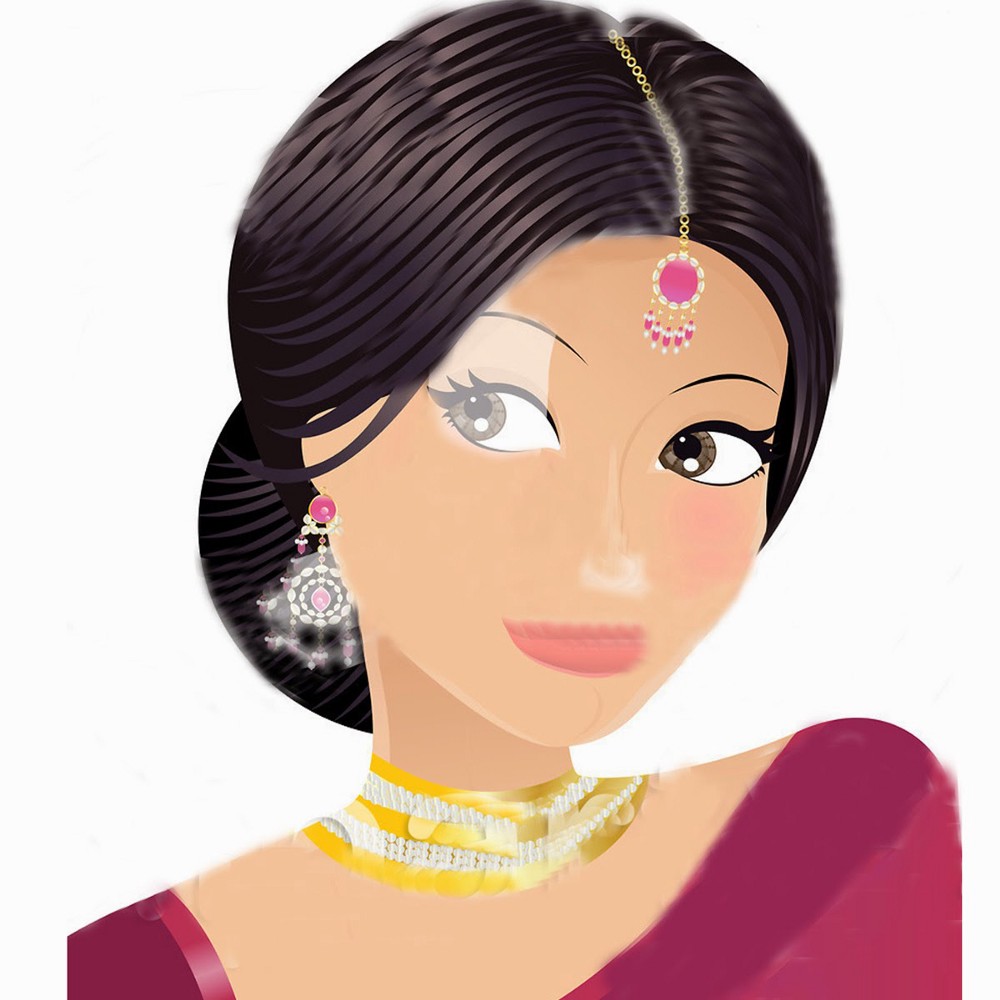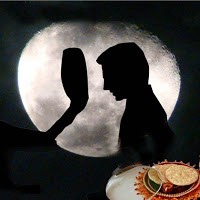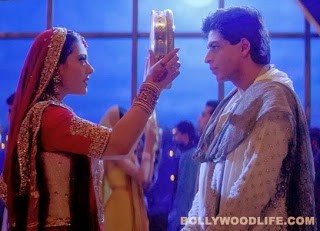
Here’s a scene straight out of a ubiquitous Saas Boohoo K-serial – or a live telecast from your neighbor’s house, or possibly, YOURS:
It is Karva Chauth. The urban Hindu wife – draped in servility, a big bindi of enslavement on her forehead, the mehndi of servitude on her palms, a mangal sutra (the mother of all married tokenisms) around her neck, dolls up to fast and pray for her Lord’o’master.
A pallu on her head completes the look of intellectual confinement and surrender.
Well, well, a rather militant way of introducing the Big Daddy of all Hindu festivals, you’d say, right? Probably yes.
But I’ve decided not to succumb to The Spiral of Silence – the psychological theory which states that minority opinions aren’t usually expressed in group settings for fear of social isolation (the fear being more pronounced in cases where an issue has a moral component).
And captain obvious tells me that the Indian connotation potpourri has no bigger moral component than mera suhaag (the husband) — whisker-trailed, of course, by ghar ka chiraag (the son).
So when I say that Karva Chauth (KC) – the Hindu Valentine – is nothing but a grim reflection of a dystopian mindset that smacks of chauvinism and reeks of gender bias, I’m not just ruffling a few moral feathers — I’m committing social harakiri and possibly exposing myself to public lynching by my extended family.
Thank God, Facebook doesn’t have a hate button; because this write-up threatens to cost me my already anorexic friend list. Still, encashing my constitutional privilege (revalidated two summers ago by tattooing my fore-finger), I dare reiterate that KC is at best discrimination wrapped in pseudo-love, and at worst a subtle instrument of social control.

You may spin any number of reconciliatory webs around this blunt fact; give it a veneer of modernity by roping in the poor husband to fast along with the wife, but there’s no way you can wish away its inherent misogyny.
Because misogyny is not always explicit violence; it is also the pita bread on which the meat sauce of cultural legitimacy is slathered to make it look like a family celebration.
A minuscule number of Indian couples, ridden perhaps by sub-conscious guilt for their growing Western proclivity, keep a ‘conjoined’ fast in a brave attempt to inject parity into KC’s congenital lop-sidedness.
The husband’s role here mutates from a smug-as-a-bug-in-the-rug receiver of spousal attention to a grudgy-fudgy ‘co-faster’ (Chetan Bhagat, are you listening?). This decision, I suspect, is more to assuage his own culpability than any concrete faith in the ‘fast’ at hand.
The happy involvement seeks to cover a murky inequality.
In any case, whether a man chooses to fast along with his wife or not, the cultural dice remains implicitly loaded in his favor. Heads, he’s magnanimous and caring metrosexual. Tails, he’s a virile alpha stud.
What is baffling about KC is that in spite of being a blatant re-assertion of traditional gender roles, it enjoys ecstatic patronage by many members of the so-called estrogen brigade.
These cause-crusaders are more than happy strutting around with sindoor-smeared partings, jauntily playing passing-the-parcel with traditional thalis, their mehndi-stained palms aflaunt.
So what is it about KC that causes even the garden-variety Feminazis to kowtow such?
Well, there appear to be more than a couple of elements at play here — the foremost being a neo-traditional sheen bestowed upon the festival through clever packaging by commercial forces.
KC is uber-romantic ( thank you DDLJ). KC is uber-moralistic (Thank you, Ekta Kapoor).
So our TV channels feature pseudo-contemporary ads (with coy brides propounding the virtues of fasting for their husbands) playing an oxymoronic rub-a-dub with progressive ad campaigns espousing gender equality.
This contra-positioning ensures that materialism thrives, and consumption industry coffers keep ringing.
A resurgence of KC also has its genesis in the Fat-Wedding Syndrome — the driving force, once again, being consumption. After all, mega celebrations mean megabucks!

For the urban woman, KC is ‘fast’ becoming a win-win. She seems to bask in its celebratory aura, the mushy romance, the beatific root-connect, those brownie points with a beaming ma-in-law, the generous gift from an obliged husband (an equivalent of the modern-day push-present for new moms).
What are a few hours of fasting in lieu of all those goodies? It’s good detox anyway!
A milch cow of sorts for the consumer industry, KC’s misogynistic origin, is now sadly a forgettable footnote in its CV.
In a society that fasts at the drop of a religious hat (Shiva to Shani and Krishna to Navratri), ‘that’s one more for a husband,’ you might ask.
The lady’s happy, the hubby’s happy, so what’s your problem dude?
Ya really, what is my problem?
My problem is that I belong to the ‘Madhu Kishwar School of Thought’ (yes, I have a JV with the lady’s views on KC).
I like to envisage a gender-neutral playing field that does not subject one spouse to social discrimination at the hands of the other; where love need not be expressed through overt rituals ( not to be mistaken with voluntary gestures of affection).
My problem is that KC makes a religious mascot out of a mortal of flesh and blood by placing him on a pedestal reserved for the divine.
Unlike other festivals where devotees beseech a Supreme Being for blessings, KC demands that the wife genuflects and seeks the blessings of her husband (besides the Moon God).
This simple ritual creates an utterly expendable divine halo around the ‘Y’ chromosome. It shows the wife that her place is at her husband’s feet; that he’s the protector of her womanhood; her purity — as if she were a piece of 24 karat gold or a glass of aqua-guarded water!

It is no secret that Indian society starts to instill a feeling of inferiority in its women at a very young age. Through superstition. Through discrimination. Through coercion — both overt and covert.
Women are conditioned to believe that their abstinence will ensure longevity for their spouses.
For centuries, KC has fanned this conditioning.
Most Indian women now actually revel in genuflecting in front of their husbands — elevating this regressive gesture to a moral trait. Those who choose not to kowtow, are looked down upon as indignant feminists, toxic for society.
Marriage is a bond of love, equality, companionship, and mutual respect. It has no space for patriarchal rituals that create some subtle and some not-so-subtle instruments of social control to oppress women.
Any tradition that urges women to deify men is no less cruel than explicit violence.
It’s time to scrap this power asymmetry.
It’s time to shuffle the deck.
It is time to deactivate my Facebook account.
—Puja Bhakoo, author, MOOD SWINGS
